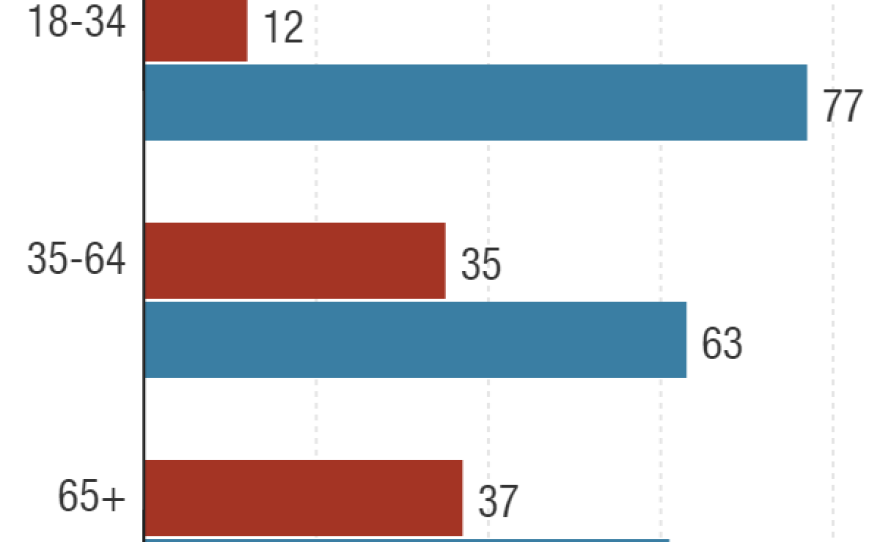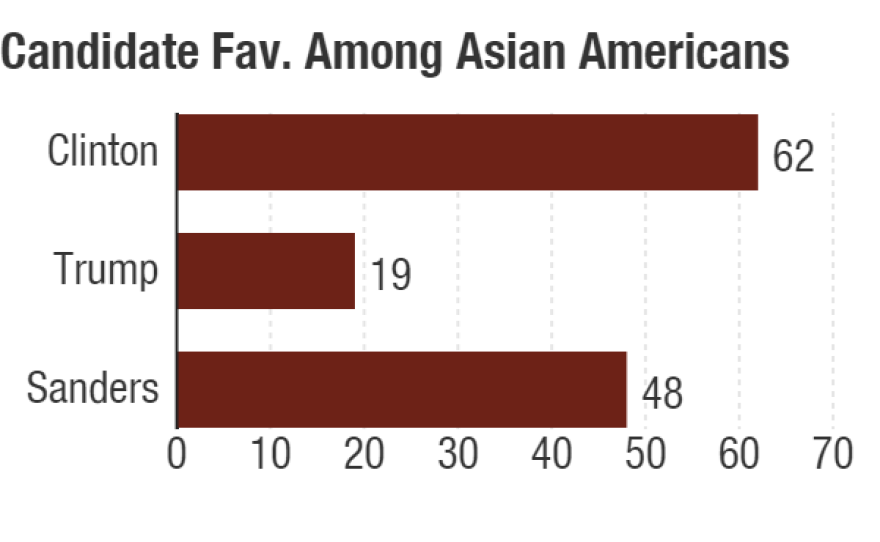

Asian-Americans are shifting toward the Democratic Party in record numbers, according to a new poll conducted by a consortium of Asian-American organizations — AAPI Data, Asian and Pacific Islander American Vote and Asian Americans Advancing Justice.
In fact, since 2012, there's been a 12 point increase in the percent of Asian-Americans who identify as Democrat — from 35 percent to 47 percent.
Asian-Americans overwhelmingly supported Barack Obama in 2012 — 73 percent to 26 percent — so these latest poll numbers suggest a crystallization of party ID among people who perhaps already lean Democrat.
But, the partisan divides are growing and particularly obvious among young Asians, who now view the Democratic party far more favorably than the Republican party (77 percent compared to 12 percent).
This 18-34-year-old population is predominantly native-born, and research suggests early voting patterns are often a predictor of later voting behavior, so this wide disparity marks an important shift.
For years, Asians were considered a swing vote. The tendency to vote Democrat in the Asian community is a fairly recent trend. As we've written previously, in 1992, less than a third of Asian-Americans voted for President Bill Clinton. But, this year, a clear majority — seem to favor his wife Hillary Clinton.
According to Karthick Ramakrishnan, a professor at UC Riverside and the founder of AAPI Data, exclusionary rhetoric seems to be driving this political shift.
More than 40 percent of Asian-American voters surveyed said they would oppose a candidate — whom they otherwise agreed with on most issues — if he/she had anti-immigrant or anti-Muslim views.
"[This] is a pretty big warning sign that a lot of the exclusionary rhetoric that we saw during the primary season and continue to see is really doing damage to the Republican party and Republican candidates," said Ramakrishnan.
As part of the GOP's Growth and Opportunity Project after Mitt Romney's 2012 defeat, Republicans have tried to make inroads in the Asian community; and, in some ways, they were successful. In the 2014 midterms, exit polls showed Asian-Americans actually leaned slightly more Republican than Democrat. But, Ramakrishnan suggests that temporary goodwill is gone.
This survey shows 19 percent of Asian-Americans have a favorable opinion of the de facto Republican nominee Donald Trump, compared to 62 percent for Clinton.
Asian-Americans are the fastest-growing immigrant group in the country, but they're rarely polled and remain somewhat of a political enigma.
This survey is the third national poll AAPI Data has conducted in recent years in attempt to better understand the Asian community. The poll interviewed 1212 registered voters from the six largest Asian ethnic groups in the country: Indian, Chinese, Filipino, Korean, Japanese and Vietnamese.
While the results show Democrats have the clear advantage going into the November election, Asian voters also remain the least likely to vote. It's complicated to mobilize Asian voters collectively — they often speak multiple languages and use different local media sources. So while Asian-Americans may overwhelmingly oppose Trump, for now, the question is whether that sentiment will translate into actual votes against the candidate.
Copyright 2016 NPR. To see more, visit http://www.npr.org/.






